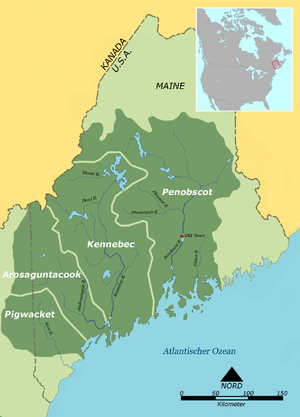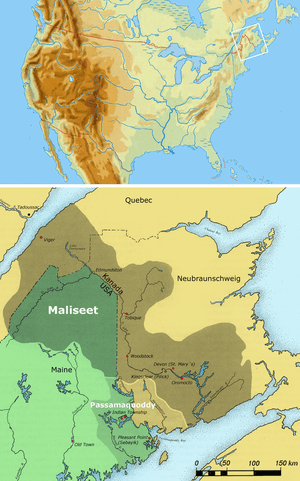Pennacook


The Pennacook, also known by the names Penacook, and Pennacock, were a North American people of the Wabanaki Confederacy who primarily inhabited the Merrimack River valley of present-day New Hampshire and Massachusetts, as well as portions of southern Maine.[1] They are also sometimes called the Merrimack people.
An Algonquian-speaking tribe, they were more closely related to the Abenaki tribes to the west, north and east, such as the Penobscot and Piguaket or Pawtucket, than to other Algonquian tribes to the south, such as the Massachusett or Wampanoag. This relationship was both linguistic and cultural. But, during the time of early Anglo-European settlement, the Pennacook were a large confederacy, politically distinct and at odds with their northern Abenaki neighbors.
History
One of the first tribes to encounter European colonists, the Pennacook were decimated by infectious diseases unwittingly carried by the newcomers. Suffering high mortality, they were in a weakened state and subject to raids by Mohawk of the Iroquois Confederacy from the west, and Micmac tribes from the north, who also took a toll of lives. Chief Passaconaway had a military advantage over the New England colonists, but he decided to make peace with them rather than lose more of his people's lives through warfare. They were caught up in King Philip's War, however, and lost more members. Although Wonalancet, the chief who succeeded Passaconaway, tried to maintain neutrality in the war, bands in western Massachusetts did not.
The Pennacook fled north with their former enemies, or west with other tribes, where the English colonists hunted them down and killed them. Those that survived, joined other scattered tribespeople at Schaghticoke, present-day New York. Those who fled northward eventually merged with other displaced New England tribes and Abenaki. Although no longer a distinct tribe, many bands of Abenaki (called Abenaqui or Oubenaqui by the French) in New Hampshire, Vermont and Canada, are descended from such Pennacook ancestors.
The Pennacook women cultivated varieties of maize, corn, and squash along fertile river beds, processing them for food and seeds for the next seasons. The men hunted in the wooded, less fertile areas.
The name Pennacook roughly translates (based on Abenaki cognates) as "at the bottom of the hill."
Influence
William James Sidis hypothesized in his book The Tribes and the States (1935) that the Pennacook tribes greatly influenced the democratic ideals which European settlers instituted in New England. But English settlers already had a historical tradition to draw from.
The name "Pennacook" has been adopted by the Boy Scouts of America's Spirit of Adventure Council for their Order of Arrow lodge.[2]
See also
References
- ↑ The Abenaki (Waban-Aki) People by Margaret Sypniewski, herbu Odrowaz
- ↑ "Pennacook Lodge, Order of the Arrow – Spirit of Adventure Council". oapennacook.org. Retrieved 2016-01-12.
- Johnson, M. and Hook, R. The Native Tribes of North America, Compendium Publishing, 1992. ISBN 1-872004-03-2
- Pennacook History
- Sidis, William. The Tribes and the States, 1935
External links
- Cowasuck Band of the Pennacook Abenaki People
- Cowasuckabenaki.org tradition site
- Pennacook Lodge, Order of the Arrow
Maps
Maps showing the approximate locations of areas occupied by members of the Wabanaki Confederacy (from north to south):
-

Eastern Abenaki (Penobscot, Kennebec, Arosaguntacook, Pigwacket/Pequawket)
-

Western Abenaki (Arsigantegok, Missisquoi, Cowasuck, Sokoki, Pennacook

